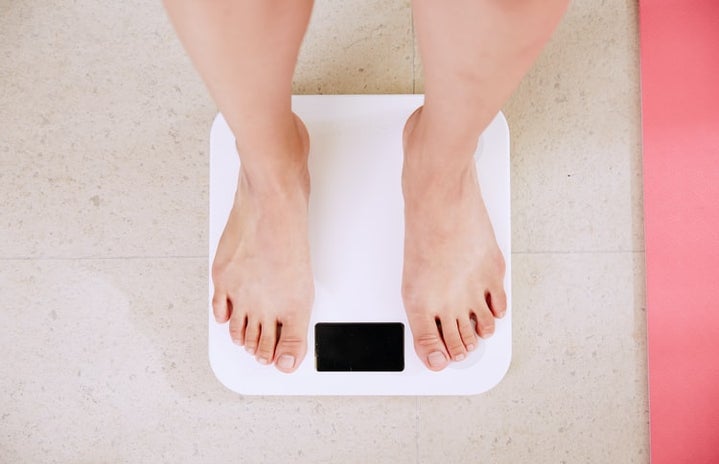This spring marks three years since I entered intensive inpatient care for Anorexia Nervosa. I’m one of the 29 million Americans who struggle with disordered eating, the 26% of those who attempt suicide, the less than 6% who are medically diagnosed as underweight, and grateful every day that I wasn’t one of the deaths that occurs every 52 minutes as a direct result of eating disorders (Alliance for Eating Disorders and ANAD).
The COVID-19 pandemic saw a dramatic rise in eating disorders, with hospital admissions more than doubling and the NEDA helpline receiving a 107% increase of users (NEDA). I, like many others around the globe, used control over what I ate to counter the complete mess of the pandemic and my own helplessness within it. For me, shelter-in-place orders contributed to already worsening anxiety, depression, OCD, and suicidal ideation. In April of 2020, I was admitted to Children’s Mercy Hospital after attempting suicide, weighing in at a number I won’t even write here (no one needs to compare their experience with mine to determine if they’re “sick enough”). After two weeks of becoming medically stable, I spent three months receiving treatment in Denver, 700 miles from my friends and family. Because of the ongoing pandemic, I spent this time without any contact with my loved ones back in Kansas City, save a 10-minute daily phone call with my parents. I spent my 16th birthday surrounded by people I had never met before and would never be allowed to contact again, not even hearing my parents’ voices because of phone problems— thank you T-Mobile!
While this was undoubtedly the lowest point in my life thus far, it taught me a lot about myself. I learned of my own strength and resilience, my ability to find joy in the little places, and most importantly, I realized I couldn’t continue living the way I was. Spring of 2020 was my first major relapse since receiving treatment back in 2017, and I was determined it would be the last. Thanks to a few authors, a lot of therapists, and some serious mental commitment, my journey to genuine self-acceptance has made enormous strides over the past three years.
Recovery is hard. Really, really hard. It takes a lot to recognize you have a problem, even more to recognize you want to change it, and still more to keep yourself accountable. There were a lot of times when recovery felt hopeless and it was easy to slide back into old habits. These battles got easier as time went on, but sometimes one bad day can make you question if the whole thing is really worth it. Because of this, I have compiled 10 reasons why recovery is worth it, every second of every day. These are 10 reasons why you should get screened, talk to a loved one, and/or seek help for your own struggles with disordered eating.
- Put more energy into what you love instead of just food. When struggling with an eating disorder, food is at the forefront of your thoughts day in and day out: what your next meal will be, how long you’ll go without eating, how you’ll work off those extra few bites, what you’ll do about that birthday cake on Friday, how hungry you are, how badly you want to bite into that person’s pizza… you get the idea. It’s exhausting only thinking about ways to hurt your body— not to mention the serious toll this can take on academic and/or professional performance. Freedom from your eating disorder means spending more mental energy on friends, school, work, and everything else in your day-to-day life that doesn’t revolve around a scale.
- Bring your actions in line with your values. It may feel as though your whole personality is your eating disorder— this looming presence that dictates what you do and think all. the. time. This mental trap keeps you from focusing on the things you really value, and may cause you to act in ways completely out of character. Focusing on what you seek in life, such as honesty and kindness, can help you realize how much you value more than physical appearance.
- Stop hiding yourself and your actions from loved ones. Eating disorders are secretive. They’re shame-driven. They thrive off of isolation from others, and they’ll encourage you to avoid the people you care about out of fear or humiliation.They may cause you to lie, giving half-truths and hasty excuses. Eating disorders keep you away from the people who matter to you.
- Stop the constant inner critic. How much would your life improve if you talked to yourself as a friend would? While easier said than done, challenging that critical voice inside your head will show you just how much you’re capable of without fear holding you back.
- Be more present where you are. Constant preoccupation with food and appearances can leave you mentally drained or distracted from the current situation. If you’re constantly giving 90% of yourself to thoughts of food and weight, you’re only leaving 10% to experience life. Suddenly you’ll look back and, rather than remembering all the laughter and smiles you shared, you’ll recall how worried you were about the way your body looked at the time.
- Have a sense of self-worth free from other people. Learning to liberate myself from the thoughts of others opened up a world of possibilities. I found I actually enjoyed spending time with myself alone and attracted much more positive people to my life. You are much more capable and valued than you think, and you will never realize that if you rely on others to tell you.
- Embrace spontaneity, adventure, and uncertainty. No more having to look at the menu before going to a restaurant or being thrown into a spiral when plans have to change. You’ll find life is much more relaxing when you can go with the flow, enjoying the moment rather than worrying about what’s next.
- Be kinder to loved ones. Eating disorders put you in a perpetually bad mood. They make you irritable. They make you snap at loved ones and feel distanced during important or life-altering events. And then, they make you feel even worse about yourself for acting this way. It’s important to remember that you are not a bad person for dealing with an eating disorder or seeking help because of it. You’re not a bad friend, your eating disorder just keeps you from showing up fully.
- Enjoy life more. To feel real joy in the in-between moments, and to actually enjoy the fun ones. You won’t have to fear a family dinner, lake trip, or girls’ night anymore. You won’t have to skip out on events just because you felt bad about yourself or worried about the food that would be there. Instead of watching life pass you by, take it in and feel all the emotions along the way. You grow so accustomed to the dense mental fog of eating disorder thoughts, you forget what it’s like to really experience life.
- Normalize therapy. Everyone should go to therapy. Everyone. Even if you don’t have a severe mental illness or traumatic experience. Venting about your life, gaining tools to weather your emotions, and receiving an outside opinion are beneficial to everyone, regardless of the mental challenges one experiences. You never need to be “sick enough” for therapy, and you certainly don’t need to be embarrassed by it.
No one has ever said they wish they could get their eating disorder back or regretted recovery once they made it through the hardest parts. I used to be just like you, thinking my eating disorder was all I had. I felt there was no way for me to be free of it. I’m here to tell you—to promise you— that it does get better. Some days are harder than others, and it may take a while, but one day you will look back and see all the progress you’ve made.
It’s important to remember you are never a burden for seeking help. The people who love you want to see you happy, and they will never hold it against you for leaning on them in your time of need. You are not alone in your struggle. If you feel you have unhealthy habits around food or exercise, I strongly encourage you to complete the National Eating Disorder Association screening tool. NEDA has a variety of other resources available for you to talk to a supportive volunteer or find an expert to contact.
Call or text (800) 931-2237 or text “NEDA” to 741-741





